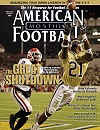AMERICAN FOOTBALL MONTHLY THE #1 RESOURCE FOR FOOTBALL COACHES
Article CategoriesAFM Magazine
|
AFM Subscribers Ask...© More from this issueThree Heisman Trophy winners in five years… USC’s Pete Carroll has had three of his players – Carson Palmer, Matt Leinart, and Reggie Bush – win football’s ultimate individual prize in his five seasons with the Trojans. He also has two National Championships, a 34 game winning streak (broken in last year’s BCS Championship with Texas) and an overall 54-10 record. Considered one of the outstanding defensive minds in football, Carroll has a combined 31 years of both pro and college coaching experience. Q. In your own words, explain your defensive philosophy of football? Eric Firestone, Assistant Coach, Talladega High School (AL). AFM subscriber since 2004. Our defensive philosophy is about getting the ball. Everyth....The full article can only be seen by subscribers. Subscribe today!
|
|
|||||||
| HOME |
MAGAZINE |
SUBSCRIBE | ONLINE COLUMNISTS | COACHING VIDEOS |
Copyright 2026, AmericanFootballMonthly.com
All Rights Reserved





